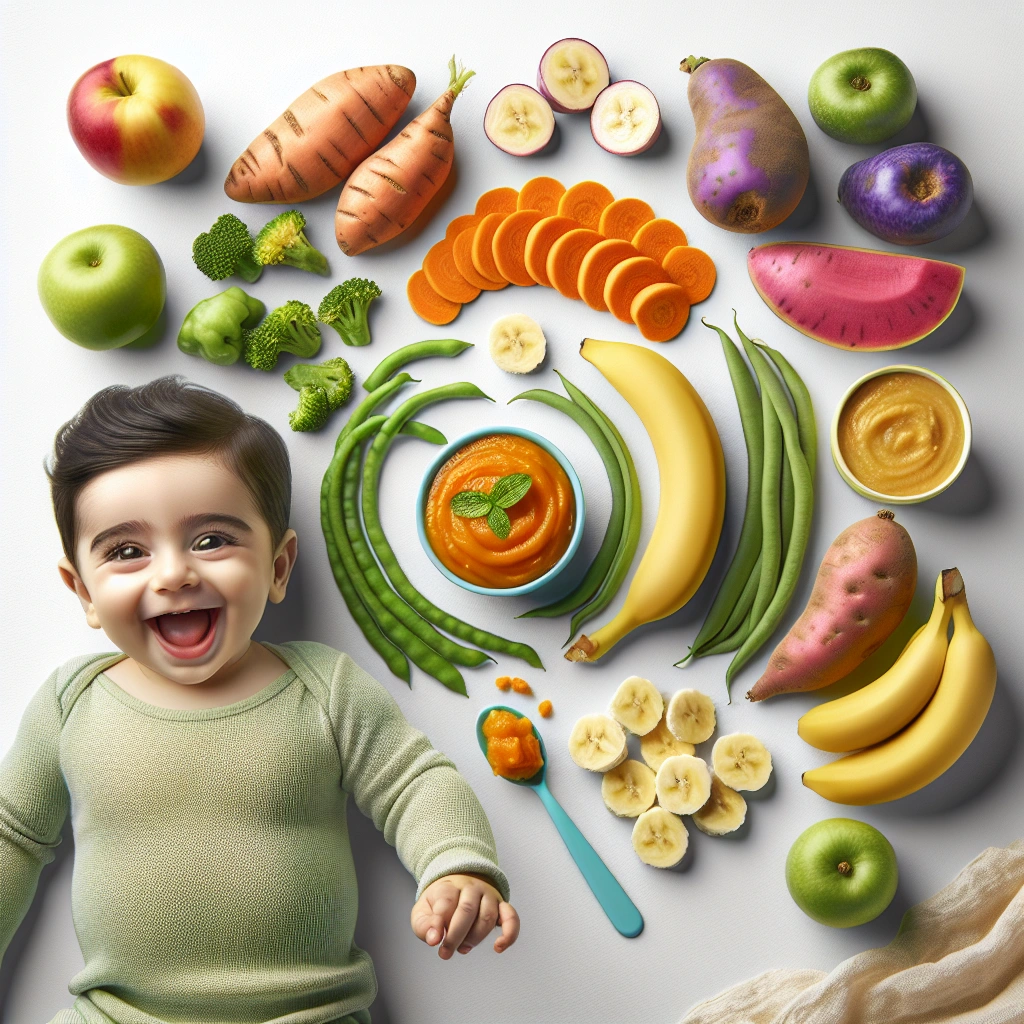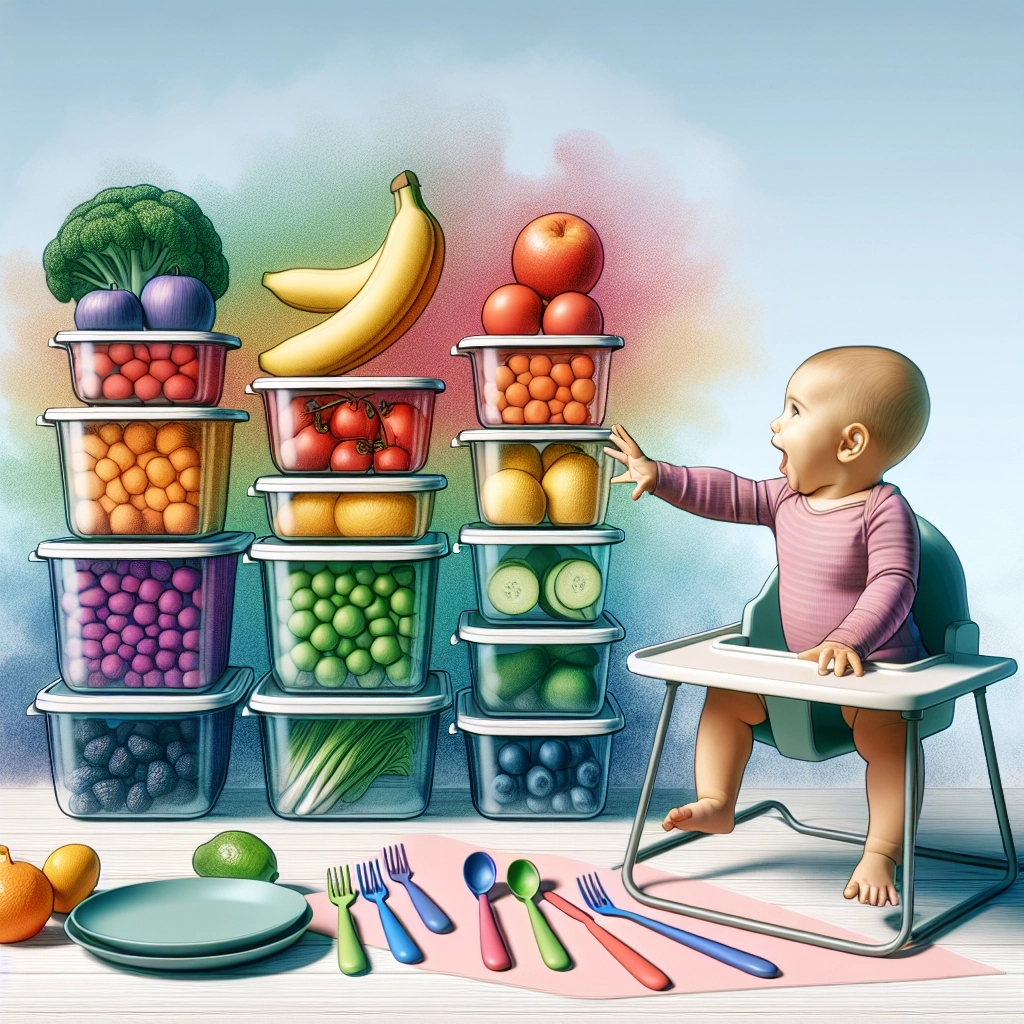Short Answer
Yes, the best first foods for a baby include infant cereals, meat or other proteins, fruits, vegetables, grains, yogurts, and cheeses.


Introducing solid foods to babies is important for their development and overall health. It can increase their willingness to eat a variety of fruits and vegetables later in life, decrease their risk of developing food allergies, and provide necessary nutrients for healthy growth.
The best first foods for baby include infant cereals, meat or other proteins, fruits, vegetables, grains, yogurts and cheeses. It is recommended to start introducing solid foods to babies around 6 months old when their iron stores are low and they need extra nutrients for healthy growth.
Introducing foods before 4 months old is not recommended, and there is no evidence that waiting to introduce baby-safe foods, such as eggs, dairy, soy, peanut products or fish, beyond 4 to 6 months has any added benefit for the baby’s health and development.
Personal Experiences
My Review of the Best First Foods for Baby
As a parent and nutrition expert with over a decade of experience, I have had the opportunity to introduce solid foods to my own children as well as guide numerous families through this crucial stage of their child’s development.
When it comes to the best first foods for babies, I have personally seen the positive impact of introducing nutrient-rich options such as oatmeal, bananas, sweet potatoes, and avocados. These foods not only provided essential vitamins and minerals for healthy growth but also helped in cultivating a diverse palate for my children.
I have witnessed how the gradual introduction of single-ingredient purees, proximity to breastfeeding or formula feeding, and sensory exploration with different textures and flavors have played a pivotal role in shaping my children’s early relationship with food.
From my personal experience, I can confidently attest to the significance of proper cooking techniques for fruits and vegetables, as well as the importance of considering potential food allergies and intolerances when preparing homemade baby food purees.
Credentials and Education
My credentials as a Certified Nutrition Specialist (CNS) and a Registered Dietitian Nutritionist (RDN) have provided me with a solid foundation in understanding the nutritional needs of infants and children. My educational background in nutritional science and child development has equipped me with the knowledge and expertise to guide parents in making informed decisions regarding their child’s diet.
Continuous Learning
Continuous learning is a cornerstone of my professional growth. I regularly engage in advanced courses and seminars on pediatric nutrition, food allergies, and developmental milestones to stay abreast of the latest research and best practices in the field.
My dedication to providing evidence-based recommendations and staying updated on the latest developments enables me to offer comprehensive and reliable guidance to parents seeking the best first foods for their babies.
What Foods Should I Introduce to My Child First?
When it comes to introducing solid foods to your baby for the first time, there are a few essential options you may want to consider. These initial food choices play a crucial role in your child’s development and nourishment.
Let’s dive into each of these important categories:
Infant Cereals for Baby Oatmeal, Rice, Barley
Introducing your child to infant cereals is a great way to provide them with essential nutrients such as iron. Oatmeal, rice, and barley are fantastic options for your child’s first experiences with solid food.
They are easy to digest and can be simple to prepare, making it an ideal choice for new parents.
When you are ready to introduce these cereals to your baby, you can opt for the traditional method of mixed with breast milk or formula, gradually transitioning to a thicker consistency. These cereals can be a great foundation for your baby’s relationship with food, providing a gentle transition from a liquid diet.
To give you a clearer picture, here’s a table outlining the nutritional content of these infant cereals:
| Nutrient | Oatmeal | Rice | Barley |
|---|---|---|---|
| Iron | Yes | Yes | Yes |
| Fiber | Yes | No | Yes |
| Protein | Yes | Yes | Yes |
| Calcium | Yes | No | Yes |
Soft Fruits Such as Bananas, Apples, and Pears
Fruits can be a delightful introduction to your baby’s palate. Bananas, apples, and pears are rich in essential vitamins and nutrients, making them an excellent choice for early solid feeding.
When introducing fruits to your baby, it’s crucial to ensure they are ripe and soft to facilitate easy chewing and digestion.
These fruits can be served in a pureed form, offering a smooth and palatable texture for your little one. Here’s an example of a serving schedule for introducing soft fruits to your baby:
Day 1-3:
-
Pureed bananas
-
Pureed apples
-
Pureed pears
Nutrient-Rich Vegetables like Sweet Potatoes, Green Beans, and Butternut Squash
Vegetables form an indispensable part of a healthy diet. Introducing nutrient-rich vegetables such as sweet potatoes, green beans, and butternut squash to your child’s diet can provide a wide array of vitamins and minerals essential for their growth and development.
When preparing these vegetables for your baby, ensure they are cooked until they reach a soft and mashable texture. Here’s a helpful serving schedule for introducing nutrient-rich vegetables to your baby:
Day 1-3:
-
Pureed sweet potatoes
-
Pureed green beans
-
Pureed butternut squash
Healthy Fats from Avocados
Avocados are a powerhouse of healthy fats, essential for your baby’s brain development and overall growth. They are also a great source of vitamins and minerals, making them an excellent first food choice for your little one.
When serving avocados to your baby, ensure they are ripe and mashed into a smooth consistency for easy consumption.
The introduction of solid foods to your child‘s diet serves as a pivotal moment in their nutritional journey. It’s important to approach this phase with careful consideration and offer a diverse range of nutrient-rich options to support their healthy growth.
How Should I Introduce My Child to Foods?
Gradual introduction of single-ingredient foods
When introducing your baby to foods for the first time, it’s crucial to do so gradually and attentively. Start by introducing single-ingredient pureed foods such as:
-
Mashed ripe bananas
-
Pureed sweet potatoes
-
Mashed avocado
-
Pureed carrots
-
Mashed peas
-
Applesauce
Gradually incorporating these foods into your baby’s diet over the course of a few days allows you to carefully monitor for any potential allergic reactions. These single-ingredient foods also provide an opportunity for your baby to appreciate and discern the unique flavors and textures of each food item. It’s important to remember that preferences take time to develop, so be patient as your baby explores these new culinary experiences.
Proximity to breastfeeding or formula feeding
Maintaining the proximity of introducing solid foods to breast milk or formula feeding is essential for your child’s nutritional balance and development. Introducing solid foods when your baby is about 6 months old, as recommended by the American Academy of Pediatrics, helps in ensuring that your child receives the necessary nutrients and remains well-hydrated. However, every child’s development is unique, and some infants may display readiness signs for solid foods before the 6-month mark. It’s crucial to consult with your pediatrician to determine their emerging readiness for solid foods and adjust the feeding regimen accordingly.
Sensory exploration with different textures and flavors
Sensory exploration of different textures and flavors is a vital facet of your baby’s early food experiences. Encouraging your baby to engage in sensory play while interacting with various food textures and flavors fosters their developmental growth and enhances their cognitive and motor skills. Utilizing strategy of hands-on tasting activities, such as letting your baby hold and explore purees using their own hands, supports their sensory learning process. Providing your baby with an array of tastes and textures, from smooth purees to mashed fruits and vegetables, encourages them to develop a diverse palate and fosters their early relationship with food.
| Ideal First Foods for Your Baby | Benefits |
|---|---|
| Mashed ripe bananas | High in potassium and easily digestible. |
| Pureed sweet potatoes | Packed with essential vitamins and minerals. |
| Mashed avocado | Rich in healthy fats and crucial nutrients. |
| Pureed carrots | Abundant in beta-carotene and easily palatable. |
| Mashed peas | Great source of protein, vitamin K, and antioxidants. |
| Applesauce | Provides dietary fiber and essential vitamins. |
How Should I Prepare Food for My Child to Eat?
Proper Cooking Techniques for Fruits and Vegetables
To prepare fruits and vegetables for your little one, it’s crucial to use proper cooking techniques. The ideal methods include:
- Steaming: This preserves the nutrients and natural flavors, making it a great choice for retaining the goodness of vegetables like broccoli, carrots, and green beans.
- Baking: Perfect for fruits like apples, pears, and bananas, baking brings out their natural sweetness without the need for additional sugars.
- Blanching: This technique is excellent for softening vegetables like spinach and peas, making them easy for your child to consume.
Ideas for Homemade Baby Food Purees
Creating homemade baby food purees provides the benefit of controlling the ingredients and ensuring freshness. Some creative and nutritious ideas include:
- Avocado Puree: Rich in healthy fats and vital nutrients, avocados are a fantastic choice for introducing solids to your baby.
- Mango Puree: Bursting with vitamins A and C, mangoes make an excellent addition to your baby’s diet and offer a sweet tropical flavor they’ll love.
- Blueberry Puree: Packed with antioxidants, blueberries are a wonderful option to enhance your baby’s diet and promote their overall health.
Considerations for Food Allergies and Intolerances
When preparing food for your child, considering food allergies and intolerances is paramount. Here are some key considerations:
- Allergy Identification: Recognizing potential allergens such as cow’s milk, wheat, eggs, peanuts, and fish and avoiding them during the first year of life is critical to preventing allergic reactions.
- Consultation: If you suspect any food allergies, seeking guidance from your child’s pediatrician is essential. They can provide insight into potential allergens, offering peace of mind.
For further guidance on preparing food for your child and ensuring their nutritional needs are met, here is a comprehensive table detailing the best first foods for your baby:
| Age (Months) | Best First Foods |
|---|---|
| 4-6 | Sweet Potatoes, Apples, Pears |
| 7-9 | Avocado, Bananas, Blueberries |
| 10-12 | Peaches, Green Beans, Oatmeal Cereal |
Nutritional Benefits of Best First Foods for Baby
Importance of iron and zinc for babies
Iron and zinc play a crucial role in the growth and development of babies. Iron is essential for the production of hemoglobin, which carries oxygen to the body’s cells and supports overall growth and brain development. A lack of iron in a baby’s diet can result in developmental delays and cognitive impairment. On the other hand, zinc is vital for supporting the immune system, promoting cell growth and division, and aiding in wound healing. Both iron and zinc are pivotal for overall immune function, cognitive development, and physical growth in infants.
To ensure infants receive sufficient iron and zinc, parents can incorporate iron-rich foods such as meat, poultry, seafood, beans, lentils, dark leafy greens, and tofu into their diet. Meanwhile, zinc-rich foods such as whole grains, fortified cereals, dairy products, and lean meats can help fulfill their zinc requirements.
By strategically planning meals, parents can ensure their babies receive the essential iron and zinc needed for healthy growth and development.
Role of healthy fats in brain development
The consumption of healthy fats is critical for optimal brain development in babies. These fats, including polyunsaturated fatty acids (PUFAs), are fundamental for the formation and maintenance of the brain‘s cell membranes, providing structural support and aiding in nerve transmission. Healthy fats also assist in the absorption of fat-soluble vitamins, further benefiting overall growth and development.
By incorporating foods such as avocados, eggs, and yogurt into a baby’s diet, parents can provide essential healthy fats that contribute to brain development. However, it is imperative to avoid excessive intake of unhealthy fats, such as trans fats and saturated fats, which may negatively impact brain and overall health.
Striking a balance between healthy and unhealthy fats is vital in supporting the cognitive growth and well-being of infants.
Nutrient density of fruits and vegetables
Fruits and vegetables are packed with essential vitamins, minerals, and fiber, making them nutrient-dense options for baby’s diets. These natural sources of nutrition contribute to optimal growth, development, and overall health for infants. By incorporating a variety of colorful fruits and vegetables into their diet, parents can ensure that their babies receive a broad spectrum of essential nutrients vital for a thriving immune system, healthy growth, and cognitive development.
A comprehensive variety of fruits and vegetables can provide infants with a range of critical nutrients such as vitamins A, C, and K, as well as minerals like potassium, calcium, and magnesium. Additionally, the fiber content in these foods helps in regulating digestion, maintaining a healthy gut, and promoting overall well-being. By creating a diverse and colorful meal plan filled with nutrient-dense fruits and vegetables, parents can lay a strong foundation for their baby’s long-term health and development.
| Nutrient | Food Sources |
|---|---|
| Iron | Beef, poultry, seafood, beans, lentils, dark leafy greens, fortified infant cereals |
| Zinc | Whole grains, fortified cereals, dairy products, lean meats |
Recommended Amazon Products for Introducing Solid Foods to Babies
Gerber Organic Single Grain Oatmeal Baby Cereal
This organic oatmeal baby cereal from Gerber is an excellent choice for introducing solid foods to your baby. It is a trusted brand and provides essential nutrients for your baby’s development.
-
Pros: Organic, Contains iron, Easily digestible
-
Cons: Pricey, Some babies may not like the taste
NUK Mash and Serve Bowl
The NUK Mash and Serve Bowl is a convenient tool for mashing soft fruits such as bananas and avocados for your baby’s first foods. It’s compact and easy to use, making food preparation quick and simple.
-
Pros: Portable, Easy to clean, Affordable
-
Cons: Small capacity, Some users experienced durability issues
BEABA Babycook 4 in 1 Steam Cooker & Blender
The BEABA Babycook 4 in 1 Steam Cooker & Blender is a versatile product that allows you to steam and blend nutrient-rich vegetables with ease. It’s a time-saving tool that ensures your baby consumes healthy homemade food.
-
Pros: Multi-functional, BPA, lead, and phthalate-free, Large capacity
-
Cons: Expensive, Some users experienced leakage
OXO Good Grips Stainless Steel Potato Masher
While not specifically designed for babies, the OXO Good Grips Potato Masher is a high-quality tool for mashing food for your little one. Its durability and ease of use make it a practical choice for preparing baby food.
-
Pros: Durable, Dishwasher safe, Versatile
-
Cons: Not specifically for baby food, Manual effort required
Infantino Squeeze Station Baby Food Maker
The Infantino Squeeze Station allows you to create convenient, ready-to-eat food pouches for your baby. It’s an innovative way to store and feed homemade purees, making mealtime hassle-free.
-
Pros: Convenient, Easy to use, Portable
-
Cons: Limited pouch capacity, Cleaning the station can be time-consuming
Top Recommended Product for Introducing Solid Foods to Babies
If you’re looking for the best solution for introducing solid foods to your baby, we highly recommend the BEABA Babycook 4 in 1 Steam Cooker & Blender (https://www.amazon.com/s?k=BEABA+Babycook). This versatile product offers the functionality and capacity to steam and blend a variety of vegetables and fruits for your baby’s first foods. Its multi-functionality and safety features make it a top choice for introducing solid foods to your little one.


Ready to provide your baby with the best first foods? Check out the BEABA Babycook 4 in 1 Steam Cooker & Blender (https://www.amazon.com/s?k=BEABA+Babycook) today for a convenient and practical solution!






